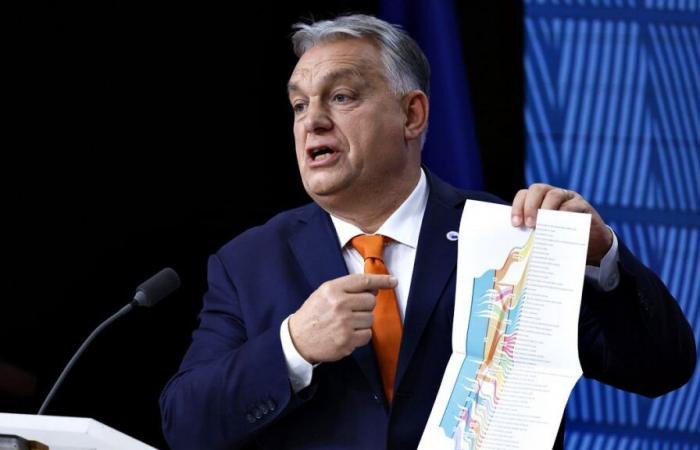Hungarian Prime Minister demands that Ukraine reopen Russian gas transit to Europe.
ADVERTISEMENT
Diplomats and officials in Brussels are holding their breath as they wait to see whether Viktor Orbán’s increasingly critical rhetoric over EU sanctions will result in a veto that could upend the bloc’s Russia policy , starting next week.
Since February 2022, the European Union has implemented blanket bans on trade with Russia in energy, technology, finance, luxury goods, transportation and broadcasting, among others. It also froze 210 billion euros of assets held by the Russian central bank within the Union, which were used to guarantee a multi-billion euro loan to kyiv.
All this could soon be called into question. The restrictions, designed to cripple Moscow’s ability to finance its massive invasion of Ukraine, must be extended every six months by unanimous vote, with the next deadline set for January 31.
In recent days, Orbán and his MPs have toughened their rhetoric against the sanctions regime, arguing that the inauguration of US President Donald Trump, who wants to negotiate with Russia’s Vladimir Putin, requires the bloc to rethink its long-standing position .
“The issue of extending sanctions is now on the agenda, and I have pulled the handbrake and asked European leaders to understand that this cannot continue,” the Hungarian Prime Minister said during a radio interview Friday morning.
One of his ministers, Gergely Gulyás, openly questioned the biannual renewal. “Until now, everyone has considered the extension of sanctions as automatic, but we do not think it is automatic now,” Gulyás said on Thursday.
The comments fueled fears that Hungary could use its veto to block the renewal, leading to the collapse of a sanctions regime painstakingly crafted from 15 packages, and depriving the EU of its most powerful tool. more effective against the Kremlin.
“It is clear that if Budapest blocked, we would have a big problem to deal with,” said a senior diplomat, who spoke on condition of anonymity because of the sensitivity of the issue. “Budapest is playing with fire.
The diplomat described the political situation as “mind-blowing” given the dire battlefield conditions facing Ukrainian forces, and predicted the EU would plunge into “uncharted territory” if sectoral sanctions collapse overnight the next day.
“The shenanigans we receive from Budapest are seemingly endless,” the diplomat said.
A closed-door discussion between the ambassadors on Friday only increased uncertainty, with the Hungarian representative maintaining ambiguity about his position, according to several diplomats.
Instead, Hungary asked to change the agenda of Monday’s foreign ministers’ meeting, so that the item on the renewal of sanctions, which is generally approved without problems, would be discussed openly after a discussion separate on support for Ukraine.
The Hungarian envoy also made a number of requests regarding energy policy, and in particular Ukraine’s recent decision to end the transit of Russian gas through Hungary, another diplomat said.
The move, taken by President Volodymyr Zelenskyy to prevent Moscow from making “additional billions off our backs”, sparked a furious response from Hungary and Slovakia, two landlocked countries that still buy Russian fossil fuels. Earlier this month, Slovak Prime Minister Robert Fico threatened to use his veto in retaliation.
-A “transactional” diplomacy
In his radio interview, Mr. Orbán established a direct link between the renewal of sanctions and the gas dispute, and called on the European Commission to intervene in favor of his country.
The Commission said it had “no interest” in expanding Russian gas transit.
“What is closed today must be reopened. This is not a question for Ukraine, it is a question for Europe, a question for Central Europe,” the prime minister said.
“If the Ukrainians want help, for example by sanctioning the Russians, then let’s reopen the gas transit routes and allow Central European countries, including Hungary, to receive the gas we need via the Ukraine.
The connection between the two issues has left diplomats perplexed, trying to determine how serious the latest threat really is. Mr. Orbán has used his veto power to obtain concessions before, but never to cause such a disruptive effect on sanctions.
“The threats are taken seriously. But this is not the first time,” said a diplomat, decrying the “transactional” way in which Hungary formulates its demands.
“The EU cannot go into panic mode every time someone says something in Budapest,” he added. “We have learned to make a clear distinction between what we hear in Budapest and what is happening in Brussels.
The suspense is expected to last at least until foreign ministers meet on Monday and Hungary’s representative, Péter Szijjártó, announces his country’s position. Diplomats believe that, despite the harsh remarks, Mr Szijjártó will back down if he can secure further EU aid to meet Hungary’s energy needs.
This will pave the way for approval of the renewal, if not Monday, then before the end of the month.
“We expect a positive outcome from this discussion.[Sanctionsareakeypartofourstrategy”saidaseniorEUofficialTheissueofgastransithas”nothingtodowiththesanctionsagainstRussiaThesanctionsagainstRussiaareduetoaggression[Lessanctionssontunélémentclédenotrestratégie”adéclaréunhautfonctionnairedel’UELaquestiondutransitdugazn’a”rienàvoiraveclessanctionscontrelaRussieLessanctionscontrelaRussiesontduesàl’agression
Asked whether Brussels was already preparing a plan B, the official said: “We are not considering any other plan than that of Russia: “We are not considering any other possibility than its approval in the next few days.”
The latest comments from Donald Trump, who took some observers by surprise by making bellicose remarks towards Russia, are a factor that will certainly influence the discussion.
“If we do not reach an agreement, and quickly, I will have no choice but to impose high levels of taxes, tariffs and sanctions on everything sold by Russia to the States “United States and various other participating countries,” Mr. Trump said.
“We can do it the easy way, or the hard way – and the simplest way is always the best.
The EU is already preparing a sixteenth package of sanctions against Russia, with a view to approving them before the third anniversary of the invasion, at the end of February.






